Caravan founders Laura Harper-Hinton, Chris Ammermann and Miles Kirby talk to World Coffee Portal about their passion for speciality coffee, hospitality and how they’ve maintained ‘casual excellence’ across their growing business. By Tobias Pearce
Caravan’s all-day restaurant, bar and roastery was a game-changer when it opened on Exmouth Market in 2010. Eight years later, their innovative speciality coffee and an all-day menu concept has become a pillar of London’s dining and coffeeshop scene, regularly cited among the capital’s finest.
Expansion is a logical progression for many successful ventures, but quality can often get lost in froth as sites multiply. Not so at Caravan, where each of their four venues is as distinctly boutique as the first. From the food they prepare to the coffee they source, the design of each venue and the skill of their staff – Caravan oozes professionalism wherever you find it.
We caught up with co-founders Laura Harper-Hinton, Chris Ammermann and Miles Kirby at their capacious King’s Cross branch to find out how they achieve excellence at scale.
Sitting down amid the lunchtime bustle, we put it to the founding trio that Caravan is a burgeoning London chain. “Don’t use the C-word!” they joke, jostling for space on one of the bar’s packed benches. “We prefer family of five,” says Head Chef, Miles.
It’s an apt description of Caravan’s attitude to expansion. They may have a fifth outlet and huge new roastery in the pipeline (more on that later), but the team has employed anything but a ‘cookie cutter’ approach to opening new sites.
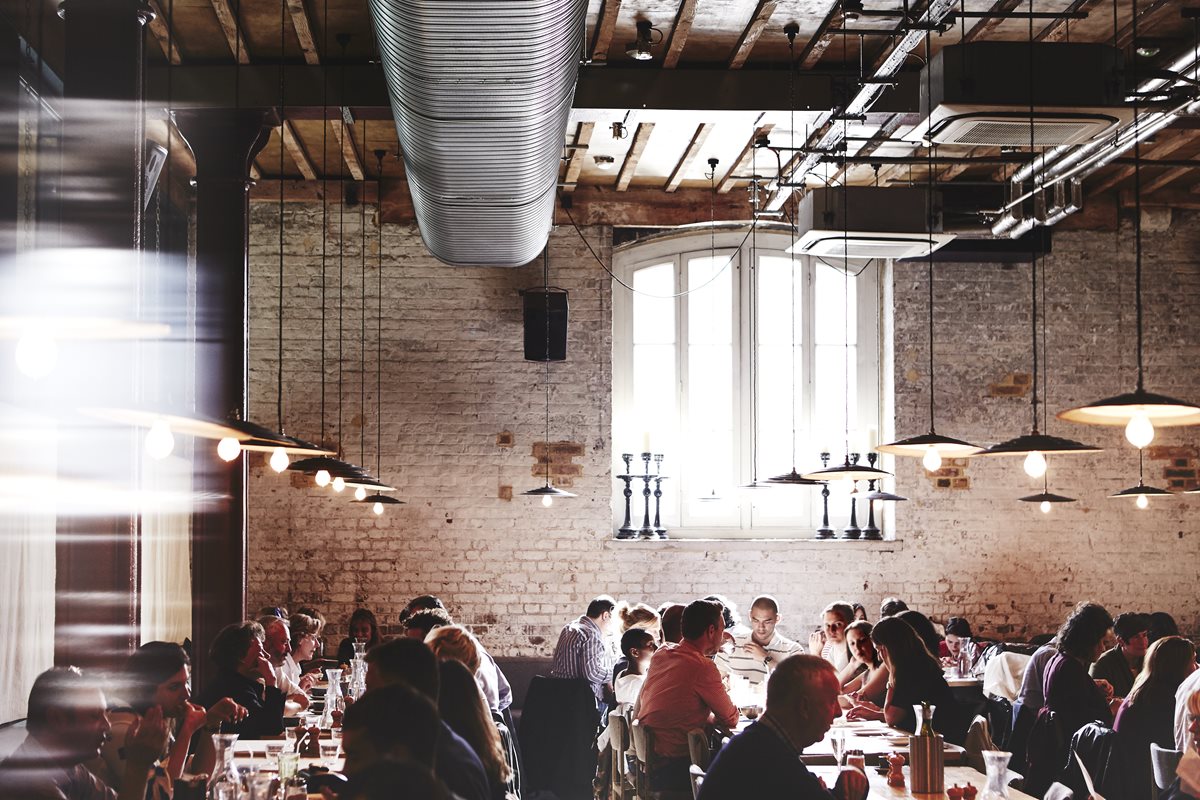
Dining at Caravan King's Cross
When Caravan began its journey on Exmouth Market, London’s speciality coffee scene was very different. Commercial Director, Chris Ammermann explains the original concept emerged from the group’s collective passion for hospitality – and identifying a big gap in the capital’s premium coffee market.
“We’d lived here for nine years and saw the coffee in New Zealand was fantastic, but not the same in London! We knew that we could deliver a better product than was already on offer. With Miles we had a partner who could run a kitchen and deliver the brunch element, which was hugely complementary to the coffee. Laura had a very strong vision for the design. All of this was a bit pared back at first because we had no money,” he laughs.
Chris tells me the economic climate in 2010 was initially their biggest challenge. “We went to every high street bank and they all knocked us back – even though everyone loved the concept,” he says.
We very much employed our New Zealand ‘can-do’ attitude. We built a lot of stuff ourselves, we broke walls down – Chris and Miles were lugging bricks up from the basement
When they did eventually secure funding, the group soon discovered they’d need to become experts in a host of unexpected fields. “Obviously we’re all passionate about food, coffee and hospitality," says Creative Director Laura Harper-Hinton. “But it’s all the back-of-house stuff we didn’t expect, like the legal negotiations (Chris and Miles grumble in agreement), dealing with the bank, putting up all the personal guarantees and working through what that means for your family – Miles had to do a crash course in HVAC!
“But we very much employed our New Zealand ‘can-do’ attitude. We built a lot of stuff ourselves, we broke walls down – these boys (she nods at Chris and Miles) were lugging bricks up from the basement.”
But did they ever think they’d own a multi-restaurant and roastery business? “Definitely not. No way,” says Laura. “When we started in Exmouth Market we had no masterplan. In hindsight, we got drawn into the romantic side of Exmouth Market. It was a bit of a risk and it could have been the beginning and the end of our dreams.”
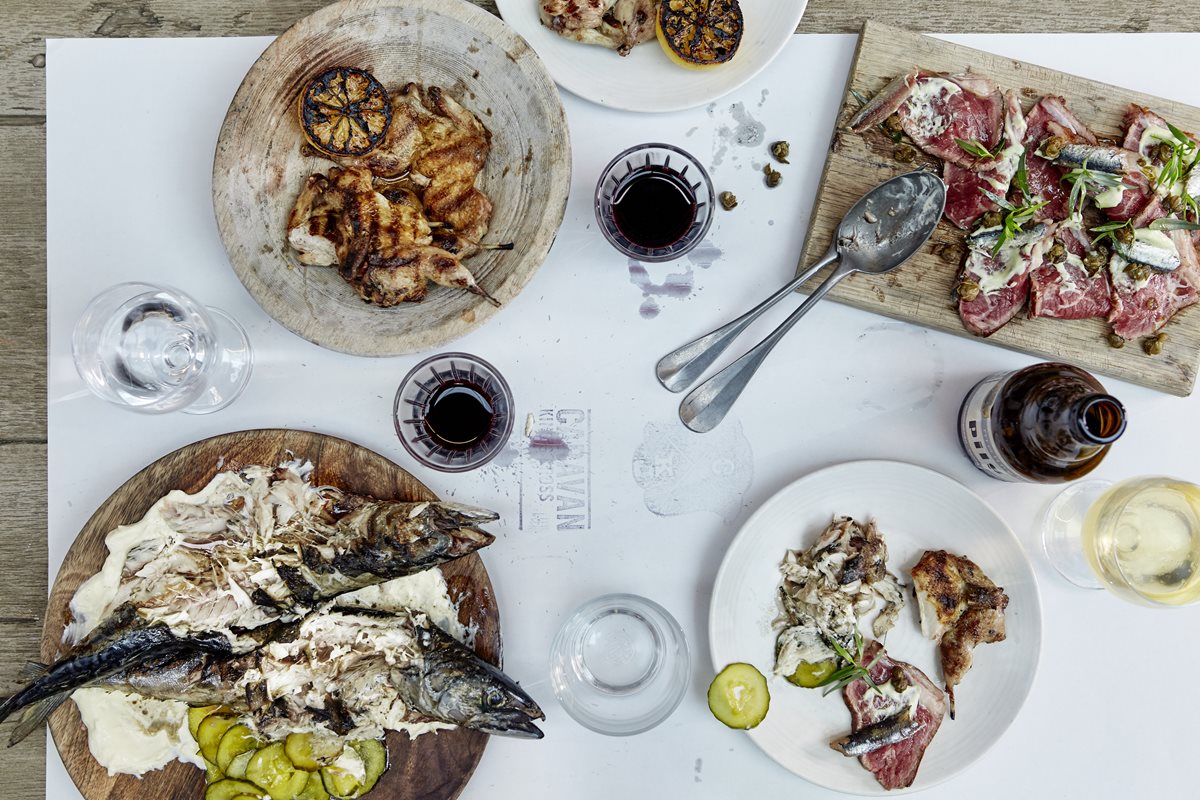
Caravan's all-day small plate concept was a game-changer in 2010
Luckily, the latter wasn’t the case and Caravan’s concept was a big hit. In 2012 the group expanded to King’s Cross, Bankside followed in 2016 and their newest branch, Caravan City, opened in 2017.
Chris explains that growing the business has been a huge learning curve, but that raising each new member of the Caravan family improves with experience. “Looking back, we probably didn’t plan as well as we could have,” he says.
“Now we walk into a site and know exactly what to ask: Is there minimum 200A power? What’s the integrity of the ceiling? Is there a riser so we can install a duct to extract from the kitchen? – you learn all these things the hard way,” adds Laura matter-of-factly.
Despite the hard graft of raising the Caravan family, the group retain a laid-back attitude that is quintessentially antipodean. Talking to them, it’s easy to see why their dedication to ‘casual excellence’, as they aptly coin it, is so intrinsic to the Caravan brand.
Hospitality’s ‘Holy Trinity’
Throughout Caravan’s evolution, the group’s collective skill across food, coffee and hospitality has been critical to the brand’s success. Laura, Chris and Miles met working at a Wellington restaurant in their 20s, an experience that introduced them to the skills necessary to build their hospitality concept. “We’re a very complementary team with the right skillsets working in the right areas of the business: Miles with the food, Chris with the coffee, operations and masses of experience in hospitality”, says Laura, adding “I do the design, and a few other bits and pieces.”
“That’s talking yourself down there, Laura,” laughs Miles.
It was a very deliberate decision to sit down and build a team to enable us to grow
In fact, all three had impressive pre-Caravan careers. Laura successfully pursued food writing and photography and ran a leading London events company, her partner, Chris, worked in hospitality, production and set design for more than 15 years. Miles too has more than 15 years’ experience as a chef, including as Head Chef at London’s acclaimed The Providores. In 2017, the group released their co-authored cookbook;
Caravan: Dining All Day.
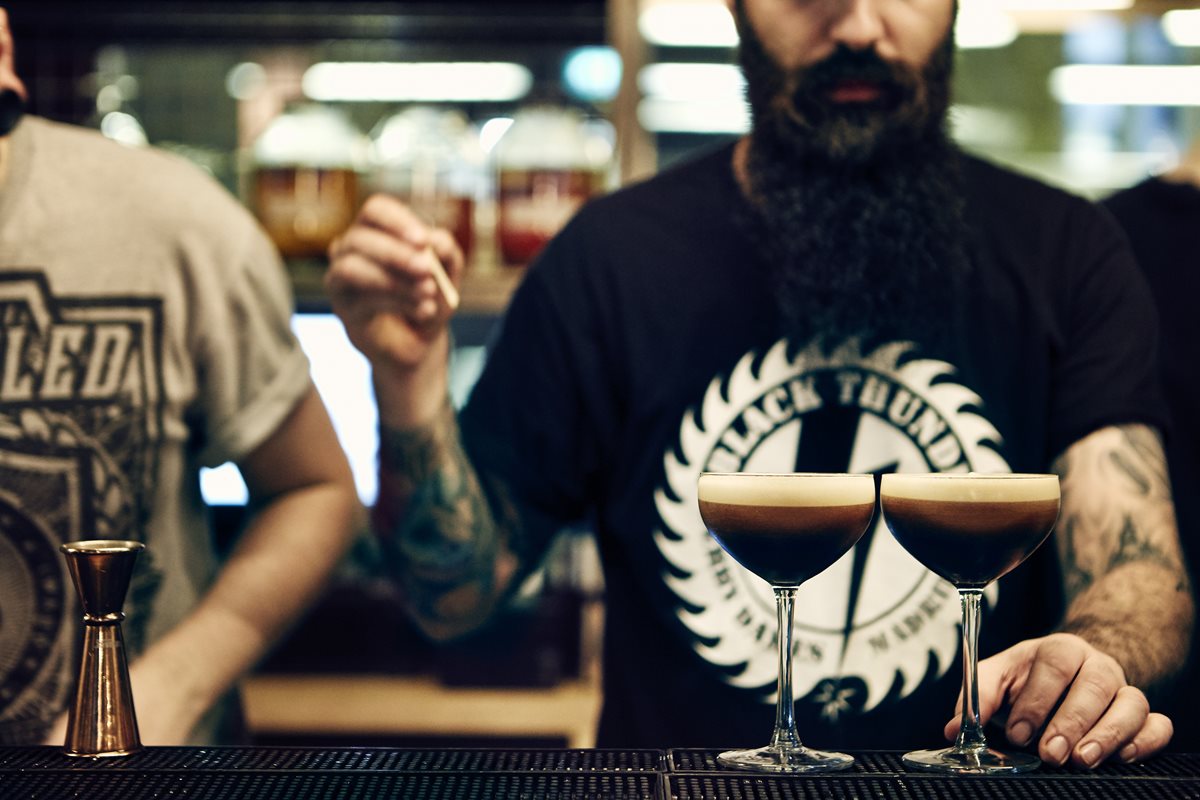
Raising the bar with espresso Martinis at Caravan King's Cross
But with Caravan’s increased reach comes the daunting operational challenge of ensuring the team’s Midas touch extends across multiple sites. It’s no easy task, so how do they achieve it?
“People”, is the simple answer from Chris. “It was a very deliberate decision to sit down and build a team to enable us to grow,” he says.
“We have to put a lot of trust in staff,” adds Miles. “We make sure that they get to spend as much time with us as possible – it’s all about watching, tasting, monitoring, feeding back. Understanding how different people react to different scenarios is key, but we also hope that people will put their hand up and tell us what they want to learn,” he says.
Every new Caravan site is now built around the skills necessary to scale-up quality. Now at the helm of 250 staff, with another 70 planned for their forthcoming Great Portland Street site, Miles explains they’re also keen to promote skills and the rewards of working in hospitality.
“I think restaurants and hospitality are in a unique position to offer kids coming out of school skills and experiences they wouldn’t normally get, like tasting some of the best food and drink in the world. I remember drinking an incredible bottle of champagne when I was about 18 and realising; ‘hang on, no one else gets to do that.’”
Evolving tastes
While Caravan’s all day small-plate and speciality coffee menu was virtually unique eight years ago, the team say the casual fine dining and speciality coffee scene has evolved significantly since then. “I’d like to think we were trailblazers in our style of food and all-day context,” Laura says. “The only other competitors offering that at the time we opened were French brasseries – a lot of people do the all-day concept now. There’s also significantly more amazing speciality coffee shops and roasters in London.”
“Competition is good,” says Chris. “It’s helped us keep our pencils sharp and London’s gone from an average eating-out and coffee city to arguably one of the best in the world.”
“As a result of that competition coming up around us, more people are talking about the bigger picture – and we’re a bigger part of that now,” adds Miles.
The team agree that innovating London’s increasingly dynamic market can be tough but add they’re always proud to rise to the challenge. “I think staying fresh is all about being genuinely passionate about what you do, not just jumping on something because you think that’s going to be the next big thing,” Laura says.
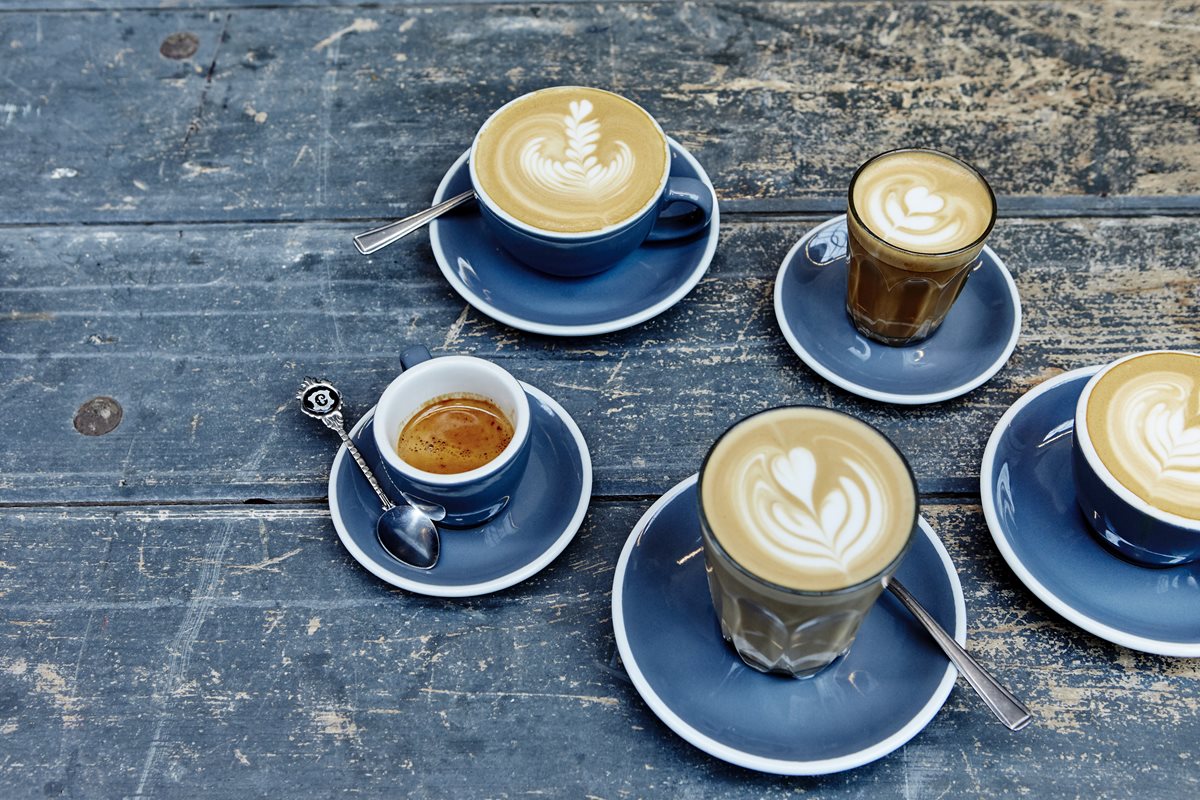
Caravan prides itself on being the 'intrinsic link' between coffee producers and consumers
Caravan’s coffee quest
Alongside staff, skills and training, Chris tells me that sourcing and supply chain oversite are critical to delivering quality at scale. This is especially true of Caravan’s award-winning roastery business, which sources beans directly from farmers worldwide and prides itself on being the ‘intrinsic link’ between producers and consumers.
Today Caravan roasts nearly four tons a week, 95% of which comes through direct relationships.
“With our coffee supply chain, we asked: How can we be the best sourcer and roaster in the UK? A big part of that was trading in direct relationships. We became very closely linked to New-Zealand-based green coffee firm Raw Material, which deals directly with farmers in Rwanda, Burundi and Colombia – where we’re also invested in a farm called El Fenix. We also import directly from Guatemala with Third Wave Coffee Source, Nicaragua through Gold Mountain Coffee and El Salvador through Rafiki – we sent two people to Ethiopia and Kenya last week to buy a container of coffee.”
We’re really proud of what the guys have achieved in the roastery – I think our coffee is bloody good quality!
The logistics behind Caravan’s roastery are certainly impressive, but it’s the close relationships forged by the team that enable the business to flourish. “We’ve got three Q-graders in the business and we send them out to start relationships,” Chris continues.
“We’re fortunate that a lot of farmers are on social media, co-ops and exporters also get in touch with us. Our colleague Sam is currently in Guatemala and will be on his way to Nicaragua and we’re also going to Panama to visit Finca Deborah. Our focus is always on quality and making longstanding, sustainable relationships. We’re always working with a really passionate group of coffee enthusiasts to deliver that quality.”
Laura adds that building relationships has been a huge time and material investment, but that ultimately this was “the only decision to make.”
“We care about quality, but also about the sustainability of our relationships. It’s been a long road over the last few years getting to the point we are now, but we’re really proud of what the guys have achieved in the roastery – and I think our coffee is bloody good quality!”
A new roaster in the works
As Caravan’s quest for coffee excellence continues, so begins the next chapter of their expansion. Not far from their King’s Cross site, the team are busy refurbishing an 8,500sq ft Victorian warehouse at the Lamb Works, a space that will eventually house their new roastery, headquarters and education hub.
It was about ensuring we’re producing great coffee, but that we’re also being environmentally friendly and good to our neighbours
The team currently uses a 25 Probat roaster, which Chris says they’ve have been “extremely happy with.” But, as he explains, another growing pain of the business is needing to expand capacity. With demand increasing on their wholesale business, Chris says that the team decided to invest in a 70kg Loring – “a beast,” he says.
“We’re roasting close to four tonnes a week now, so that on a 25-kilo roaster is stretching it. When we have the 70kg up and running it will be 20 hours a week. We also looked at the long-term sustainability and environmental benefits of the Loring. We’re in quite a built-up residential area, so it was about ensuring we’re producing great coffee, but that we’re also being environmentally friendly and good to our neighbours.”
Laura explains that aside from almost tripling their capacity, the new roastery will function as a community and education hub. Customers will be able to watch roasting and bagging, with the main space used to host events, talks – and even a Caravan podcast. “The middle of the space is flooded with natural light – that’s where all the magic will happen. The front of the building will be customer-facing, so they’ll be able to look inside. We really want to open it up to the coffee community.”
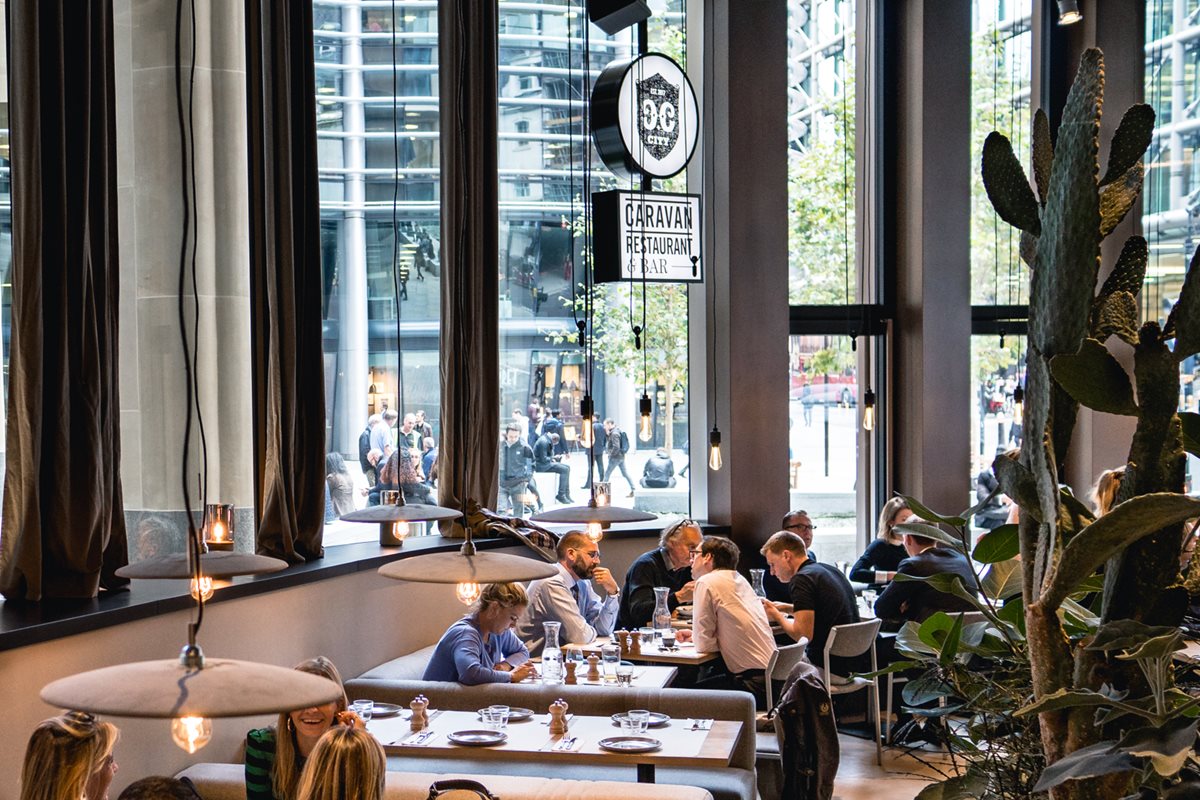
Caravan City joined the family in 2017
The road ahead for Caravan
Luckily for the Caravan founders, gone are the days where opening a new site means lugging bricks from basements and taking ad-hoc HVAC courses. In early 2017 the team took on private equity firm, Active Partners, as a minority shareholder to realise their ambitions at Great Portland Street and the Lamb Works. “We’ve had a lot of people knocking on our door, but we were in no real hurry, it was about finding the right fit,” says Miles.
“Private equity tends to have a bit of a bad rap for signing businesses up to particular business plans, forcing openings that aren’t right – we’ve not got ourselves into that position,” Laura adds. “We also felt that in terms of growth, both for ourselves and the business, it would be useful to get some external thoughts that would help us strategise where we want to take things."
As for the future expansion, the ambitious New Zealanders aren’t ruling anything out. “We just want to be better,” says Chris. “But we’ve got some really great projects we’re working on – it’s really exciting.”
Of that, there is no doubt. If Caravan’s meteoric success in London is anything to go by, it’s easy to imagine their boutique business growing well beyond the UK, to Europe – and beyond.